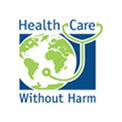Hospitals can heal America through what and how they buy
We can harness health care’s enormous purchasing power to heal the environmental and social conditions that are making people sick in the first place.
Health care sits at the epicenter of the COVID-19 and climate crises, caring for those who are stricken by the virus or, find themselves in the paths of wildfires, hurricanes, heat waves, and drought. Low-income communities and communities of color are suffering from the worst impacts of air pollution, extreme weather events, and the pandemic. Those who live in communities that experience the worst air pollution are more susceptible to extreme respiratory symptoms related to COVID-19. The pandemic has shown us in stark terms that the inequities that plague our nation remain a collective wound that continues to define this country exacerbating social, economic, and environmental disparities.
As a sector, health care is charged with the health and healing of the communities they serve. This juxtaposes its heavy reliance on systems that are fossil fuel-based which not only contribute to more than 7 million air pollution deaths per year globally but are the principle drivers of the climate crisis.
By shifting from fossil fuel utilization to investing in renewable energy, health care would actively address the epidemic of respiratory and cardiovascular disease in our country, support job creation in the clean energy sector as well as reduce the nation’s climate emissions.
In September, to help improve the conditions for health in its communities, Kaiser Permanente became the first health care system in the United States to achieve carbon-neutral status, eliminating Kaiser Permanente’s 800,000-ton annual carbon footprint, the equivalent of taking 175,000 cars off the road. Kaiser Permanente is currently ranked No. 6 in the United States for companies with the most solar energy investment, according to the Solar Energy Industries Association.
Over the last ten years, Kaiser Permanente has embraced renewable energy and worked hard to embed sustainable practices within business operations. While certified by the CarbonNeutral Protocol for Scope 1 emissions (direct emissions from sources it owns or controls) and Scope 2 emissions (emissions attributable to the electricity it consumes), Kaiser Permanente is now turning its attention to expanding its reduction of Scope 3 emissions (emissions from sources it does not directly own or control), including its supply chain.
At the time of Kaiser Permanente’s Carbon neutrality announcement, Chairman and CEO Greg A. Adams said: “As wildfires rage across the Western U.S., we can all see that the health impacts of climate change are not abstract or far in the future — they are here today, and they disproportionately impact the most vulnerable among us. We must recognize, for example, that the pollution that leads to respiratory illnesses and is linked to higher mortality rates from COVID-19 disproportionately impacts Black and low-income communities. In order to create a healthier, more sustainable path forward, we must address the inseparable issues of climate and human health as one.”
Advocate Aurora Health believes clean air saves lives. The health system located in Illinois and Wisconsin has been a leader in energy conservation for the past decade and has committed to source 100% of its electricity by 2030. Transitioning to clean energy will reduce carbon dioxide emissions by nearly 400,000 metric tons — equal to removing 84,000 passenger cars from the road each year while also reducing pollution particulates contributing to chronic health conditions, such as asthma. Advocate Aurora Health also leverages their purchasing power to make value-based purchasing decisions in alignment with their commitment to supporting local and diverse businesses and sustainable products and services. It’s not always the lowest cost that wins the day. By taking an ethical approach to decision making whenever possible, several factors are weighed to optimize the greatest impact on supporting local economic vitality, ensuring environmental conservation and safety, while also being good stewards of its financial resources.
Advocate Aurora Health recently had an opportunity to consider options for sourcing its annual $3.5 million copy paper spend. Sourcing options ranged from 100% virgin paper from a non-diverse owned business — but with the greatest cost savings potential — to a 30% recycled paper sourced from a minority-owned business with fewer cost savings. The system opted for the latter with wins in all categories: environmentally preferable, a local minority-owned business, and bottom-line savings.
“Our system sees the use of ethical guardrails as the best way to ensure accountability for selecting safer, healthier products and increasing diversity in its supply chain,” says Bruce Radcliff, system vice president supply chain of Advocate Aurora Health.
Not all purchasing decisions are as clear cut, but certainly instructive for enabling an intentional approach that is mutually beneficial for society and the health care sector’s multi-billion-dollar supply chain.
As community anchors, U.S. hospitals can use their purchasing power to improve the health of their communities. They can help heal systemic racism in America by contracting with more local and minority-owned businesses for sustainable and environmentally preferable products, both reducing their reliance on suppliers overseas while increasing and stimulating job creation.
Health systems have a moral and mission-related responsibility to heal themselves and the communities they serve. Representing almost 20% of the nation’s overall economy it is the only sector that is underpinned by an ethical framework. By incorporating this framework into current procurement practices we can harness health care’s enormous purchasing power to heal the environmental and social conditions that are making people sick in the first place.
